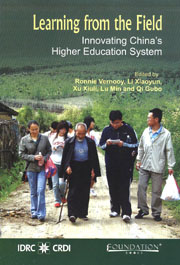Book contents
- Frontmatter
- Contents
- Foreword
- Preface
- Acknowledgements
- Chapter 1 A New Journey
- Chapter 2 Preparations: Every Long Journey Begins with a First Step
- Chapter 3 The First CBNRM Course in Beijing: An Itinerary of Remarkable Experiences
- Chapter 4 The 2006 CBNRM Course: Masters of Our Destiny
- Chapter 5 The Participatory Rural Development Course in Changchun: Making the Road by Walking Together
- Chapter 6 The Fellowship Support Programme: Learning in the Field
- Chapter 7 The Fruits of Teamwork: A Synthesis of Our Learning Journey
- Glossary
- References
- Notes on contributors
Foreword
Published online by Cambridge University Press: 26 October 2011
- Frontmatter
- Contents
- Foreword
- Preface
- Acknowledgements
- Chapter 1 A New Journey
- Chapter 2 Preparations: Every Long Journey Begins with a First Step
- Chapter 3 The First CBNRM Course in Beijing: An Itinerary of Remarkable Experiences
- Chapter 4 The 2006 CBNRM Course: Masters of Our Destiny
- Chapter 5 The Participatory Rural Development Course in Changchun: Making the Road by Walking Together
- Chapter 6 The Fellowship Support Programme: Learning in the Field
- Chapter 7 The Fruits of Teamwork: A Synthesis of Our Learning Journey
- Glossary
- References
- Notes on contributors
Summary
This book documents with detail and insight an initiative to reorient the teaching and research of Chinese universities so that their faculty and students could make more direct and significant contributions to what has come to be known as ‘Community Based Resource Management’ (CBNRM).
There have been some previous initiatives in the domain of economic and social development to achieve what has been referred to as ‘bureaucratic reorientation’ (Korten and Uphoff, 1981), or BRO in brief. Not many efforts have been made explicitly to achieve ‘university reorientation,’ which is the focus of this book – curriculum reform, changing staff responsibilities, moving research and learning activities to field locations, introducing new criteria for achievement.
One of the lessons from other experience with BRO is that institutional reorientation needs to be part of some goal-oriented, substantive undertaking, embarking upon reorientation for its own sake is not likely to be successful. People are generally resistant to being ‘reoriented’ unless they regard the changes being proposed in organisational structure, mission, staffing, incentives, accountability, etc., as serving some compelling or transcendent purpose (Uphoff et al., 1991). The forces of collective inertia and individual rationalisation and defensiveness reinforce and raise the costs of making institutional changes.
The admonition of Italian political theorist Niccolo Machiavelli in his classic treatise The Prince may sound extreme, but the essence of his message has seldom been contested – ‘It must be considered that there is nothing more difficult to carry out, nor more doubtful of success, normore dangerous to handle, than to initiate a new order of things.’
- Type
- Chapter
- Information
- Learning from the FieldInnovating China's Higher Education System, pp. v - xivPublisher: Foundation BooksPrint publication year: 2008



